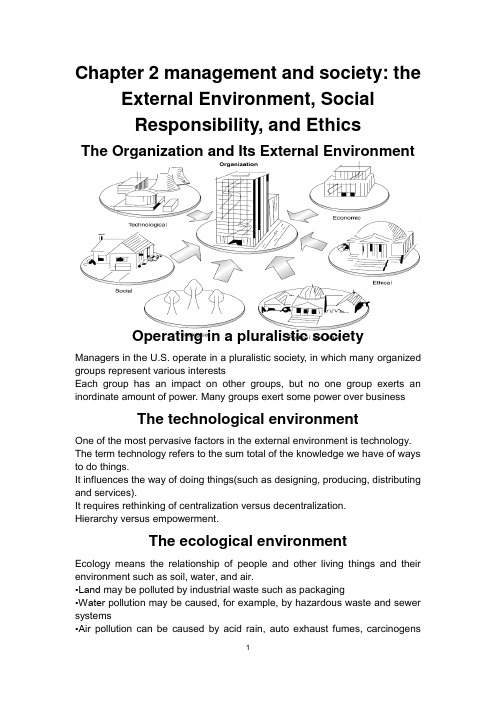第二章管理环境与社会责任(XXXX0324修订).pptx
- 格式:pptx
- 大小:1.58 MB
- 文档页数:91






Chapter 2 management and society: the External Environment, SocialResponsibility, and EthicsThe Organization and Its External EnvironmentOperating in a pluralistic societyManagers in the U.S. operate in a pluralistic society, in which many organized groups represent various interestsEach group has an impact on other groups, but no one group exerts an inordinate amount of power. Many groups exert some power over business The technological environmentOne of the most pervasive factors in the external environment is technology. The term technology refers to the sum total of the knowledge we have of ways to do things.It influences the way of doing things(such as designing, producing, distributing and services).It requires rethinking of centralization versus decentralization.Hierarchy versus empowerment.The ecological environmentEcology means the relationship of people and other living things and their environment such as soil, water, and air.•Land may be polluted by industrial waste such as packaging•Water pollution may be caused, for example, by hazardous waste and sewer systems•Air pollution can be caused by acid rain, auto exhaust fumes, carcinogensfrom manufacturing processes, and other causesThe “Greening” Of ManagementDefinition: recognition of the close link between an organization’s decisions and activities and its impact on the natural environmentResulted from highly visible ecological problems and environmental disasters ISO14001standard--to assure that company address concerns like pollution preventionsThe social responsibility of managers Corporate social responsibility is “seriously considering the impact of the company's actions on society”Social responsiveness is "the ability of a corporation to relate its operations and policies to the social environment in ways that are mutually beneficial to the company and to society”Arguments for and against social involvement of businessReaction or proaction?▪The managers should not merely react in the face of stress▪The managers must practice ways of anticipating developments through forecasts in order to react quickly to unforeseen situationThe role of the governmentSocial changes can be implemented by legislationLegislation is supposed to make it a advantage of a company that presses social problemsContributions to the solution of social problems does not always involve net expensesFor example, businesses can make profit by selling and utilizing recovered wastes.Ethics in managingEthics is the discipline dealing with what is good and bad and with moral dutyand obligationBusiness ethics is concerned with truth and justiceEthical theories1、The utilitarian theory suggests that plans and actions should be evaluated by their consequencesoffers the greatest good for the greatest numberencourages efficiency and productivitymay ignore the rights of some stakeholdersmost businesspeople subscribe to this view2、The theory based on rights holds that all people have basic rightsmay present obstacles to high productivity and efficiency3、The theory of justice demands that decision makers be guided by fairness and equity, as well as impartialityprotect the interests of stakeholders who may be underrepresented or lack powerencourages a sense of entitlement that might make employees reduce risk taking, innovation, and productivityInstitutionalizing ethicsA code is a statement of policies, principles, or rules that guide behavior. Appoint ethnics committeeTeaching ethics in management development programsFactors that raise ethical standardsPublic disclosure and publicityThe increased concern of a well-informed publicGovernment regulationsEducation to raise the professionalism of business managersWhistle-blowingBlack‟s Law Dictionary defines a whistle blower as …an employee who refuses to engage in and/or report illegal or wrongful activities of his employer orfellow employees‟.Differing ethical standards between societiesEthical as well as legal standards differ, particularly among nations and societies (moral disagreements or cultural relativism)For example:Questionable payment ; Guanxi –(informal relationships) ; euthanasia Trust as the basis for change managementTraditionally, the concept of trust is equated with integrity, loyalty, caring, and keeping promises in the relationships between and among individualsBelardo points out that trust should go beyond individual relationships and extend to the organization by creating a culture of trust that transcends individual leadershipWays of management:Theory X•The main concern is about efficiency and have the work done•The function of management is planning, organizing, leading and controlling •Give orders to subordinate•No co nsideration as to respect•Rigid regulations and institutionWays of management:Theory Y•The task is to create an environment under which people can exert their talent •Managers are not leader and supervisor. They are providing help and support •Decentral ize responsibility to subordinates in a view to realize their fulfillment •Give them more chance to participate management and decision。